Lynn Penner-Ash spent over 40 years making wine, most of it in Oregon’s Willamette Valley. After working eight years in California, she moved to the valley in 1988, when the Oregon wine industry was still in its infancy.
After a long string of successes – with plenty of challenges along the way – the couple sold the winery to Jackson Family Wines in 2016. However, Penner-Ash remained on as founding winemaker.
Earlier this fall, Penner-Ash announced her retirement from an industry that she helped define, not just as one Oregon’s most prominent ‘second wave’ of winemakers, but as a woman. As Penner-Ash discusses below, in both California and Oregon, she often found herself as “the only woman in the room” in an industry that was for a long time, and in some places still is, dominated by men.
Here, I talk with Penner-Ash about her start in the industry up until her move to Oregon. In Part II, we discuss the beginnings of Penner-Ash Wine Cellars until her retirement earlier this year. The content has been lightly edited for clarity.
You got interested in viticulture and enology pretty early on in the course of your career. How did that come about?
My grandparents had over 60 acres of Thompson seedless [grape vines] down in the Sanger/Reedly [California] area. So I’d been exposed to viticulture [and] grape growing, obviously table grapes.
My dad was stationed in Washington, DC at the Pentagon at the time, and I was working for the Smithsonian Institute as an intern in the botany department. I have always loved plants. They told me one of the best places to go to school for botany would be University of California, Davis.
I flew from Maryland to University California, Davis to attend college. I started working with plants at UC Davis. One of my roommates in college worked at Domaine Chandon [in Yountville, California] every summer, and so he said, ‘Why don’t you come work at Domaine Chandon with me and just see what it’s like to spend a summer in Napa Valley versus going back to Washington, DC?’
So I took him up on it, and I was hired by Domaine Chandon, had a great time, went back to Davis, [and] changed my degree from plant science to viticulture.
I was on the crush deck. I was running big, old massive presses the whole time. I got the graveyard shift for two years in a row, so I started at the very bottom.
That clearly left an impression though. You were still interested in it.
It was amazing. For me, smells are so exciting. I just love the smell of harvest. I jokingly say I love the smell of warm grapes that have been run over by a tractor with a whiff of diesel passing by. Those aromas just bring back such great memories of being at Chandon and all the aromas of fermentation and the tanks and the presses and things like that. I was very excited by it.
How did you eventually come to focus on winemaking?
I found that the jobs [in viticulture] for young women in the early ‘80s were very far and few between. It was hard to get anybody to recognize the fact that you might be interested in that. So I went back to Davis thinking I’d get the winemaking degree and that might be the backdoor into the viticultural degree. I realized wine was more up my alley than being out in the vineyard as a viticulturist. So I pursued a winemaking degree after that.
What was it like studying viticulture and enology at Davis at that point in time?
It was intense. We had a lot of the pre-med and veterinary students in our classes, because we had a lot of the basic chemistry and organic chemistry. We were in these huge classrooms competing with kids who wanted to be doctors. The program was very science based and very much focused on the winemaking as you advanced down the coursework.
The other irony I laugh about is the fact that Davis never really made us take any kind of economics class or marketing class. Many of us went on after our degrees at Davis after many years in winemaking and ended up either owning our own businesses or running somebody’s business, and you don’t have this basic background in business. I had a lot of catching up to do in that arena.
Honestly, I think that problem persists today. [As an industry,] we still don’t focus enough energy on teaching people how to sell and market wine.
I ran Rex Hill [Winery in Newberg, Oregon] for many years for Paul Hart. I got very, very involved with his business along with making the wine. I used to have to take off my winemaker’s hat and put my business manager’s hat on.
That’s a huge fiscal input that you have to do, even though it sounds like it’s only 100 cases. It’s a lot of money or cash flow that goes out to produce and make that new label, create that new SKU as such, get it out in the marketplace. Then if people don’t like it, you’re sitting there with 100 cases of something that you spent a ton of money on that wasn’t successful. The idea of these experimental lots, a lot of times, were a challenge, and you had to really think hard about the future of those lots.
You continued on at Chandon for three years?
Yes. At the end of my third summer there, Gino Zepponi, who was the vice president at Chandon, asked me if I’d be interested in trying a still wine harvest, because at this point, I hadn’t done a still wine. It was all bubbles. I said, ‘Sure. Why not?’
He got me a job over at Chateau St. Jean [in Kenwood, California], so I went and worked a year there, just trying to get the experience fully rounded out, not just making the bubbles. Learning more about the barreling down and the bottling process. I went back to Davis, wrapped up my degree both in the viticulture and in the winemaking side, and ended up getting hired by Stag’s Leap Wine Cellars [in Napa, California by founder] Warren Winiarski right out of college.
What was it like working for him? He is obviously a towering figure in the industry.
He could be a very difficult personality sometimes. We had one little incident when I was working at Stag’s Leap where he had hired a restauranteur from New York to come in and experience harvest. So, of course, he puts me in charge of this man, who has no winemaking experience whatsoever.
I decide to put him up on top of a big tank of Fay Cabernet, and I said ‘Just stay right here. Hold this hose over the top of the tank. I’m going to run down and take care of an addition that I need to put into this tank, but just sit tight.’
Well, he went and stopped the pump, got a cigarette, smoked the cigarette, went back up and started the pump back up again. Except he had moved the hose from the Fay Cab to the Beckstoffer Chardonnay. So we ended up having a pink wine made from Fay Cab and Beckstoffer Chardonnay.
Warren calls me into his office, and he’s very much upset with me because I have left the guy unattended. I said, ‘Well, what do you think? It was just a petite faux pas. I had to get the addition to put into the tank.’ So that became Le Petit Faux Pas at Stag’s Leap, and I kept my job.
How long did you work at Stag’s Leap?
I spent four years there as the enologist. I was really looking forward to being promoted to assistant winemaker because the job became available when the winemaker left and the current assistant moved up. I was thinking ‘I’m next in line.’ They actually hired a young man and asked me to train him, and then put him in as the assistant winemaker. And so I quit.
I kind of laughed because, Warren was a nice guy, but his comment to me was, ‘Are you unhappy? And it’s like, ‘Yes!’
Tell us about how you came to Oregon.
I got a call from [Rex Hill co-founder] Paul Hart to fly up to Oregon and check out Rex Hill. Ron and I were newly married, literally married two days or something like this at that point.
I flew up to see Paul Hart, and he offered me the job that day. I talked to Ron about it. We decided, hey, this is a great adventure. It’s kind of a great unknown. It’s not really a well-established winemaking area. As a young woman, this is an opportunity to make an impact on a region versus beating your head against the wall in Napa Valley, or I should say against the ceiling maybe. So we moved to Oregon in 1988.
Do you know how Paul Hart had heard of your name?
There weren’t a lot of female mentors in the industry at the time. I would go in and talk to Marty Banister at Vinquiry [wine testing service]. I would talk to her and ask, ‘ What did you do? How did you do this?’ because she had a UC Davis degree also.
We’d have these conversations as I’m bringing samples in to her to run for Stag’s Leap Wine Cellars. She knew I was unhappy and was really trying to figure out what my next career move would be. So she made that recommendation to Paul Hart because I guess he had called her and asked ‘Do you have anybody who you think might be willing to move to Oregon?’
What was it like in Oregon at that point in time? Obviously it was a very different industry than what we’re looking at today.
There were probably 49, 50 wineries when I got started. You’d have to travel quite a ways to go visit your fellow winemakers. We all fit in the back room at Nick’s [Italian Café in McMinnville]. We would have these monthly luncheons. We’d all be in the back room, and I would be the only woman in the room at the time.
I was embraced by some of the gentlemen in the area. They were very welcoming. I look to Ted and Terry Casteel at Bethel Heights because they always made sure I had a seat at the table and felt welcomed. But it was challenging. There were situations where you needed help with something, and it was rather off-putting when I was told to find a man that knew what was going on.
One time I was out, ready to offload a truck that pulled in full of glass for our bottling, and the truck driver said he didn’t want a woman unloading his truck. He needed a guy to unload it. So I said ‘Great. I’ll go get a guy.’
I went inside, and they were all having lunch. So I went and joined them for lunch and sat there with them for an hour until I told them, ‘Oh, by the way, there’s a trucker out there.’
There were those little instances you had to take a deep breath and grit your teeth and just kind of smile and keep moving. There wasn’t a whole lot you could do by causing a big old scene about it because you need your glass or you need that pump fixed.
At the same time, bumping up against those problems constantly must have been very frustrating.
We just had a big birthday party/retirement party for me, and my husband got up and was talking about my career a little bit and he mentioned some of the challenges that I had experienced.
[A male friend] came up to me later and says ‘I didn’t realize you had it that hard.’ And I’m thinking ‘You’re a friend of mine. How did you not realize that I was experiencing some of these challenges?’
We’d go out together and people would talk to the guys and think I was Laurent [Montalieu]’s date or Steve [Doerner]’s date. Not that I was a woman winemaker with my male peers, that we’re all qualified winemakers in the group together.
Talk to me about what winegrowing and production was like at that point in Oregon.
Mind blowingly different than the Napa Valley! Maraschino cherry 4×4 wood bins. When I walked into Rex Hill I asked ‘This is what you ferment your grapes in?’ They bring you fruit in these rickety old bins that are falling apart and smell like acetic acid. It was shocking to me.
Using dairy tanks for your lees filtration. That was the only way you could cool your ferments was put them in these dairy tanks. So I learned to MacGyver a lot of things. It was always a big joke. It was ‘The MacGyver Years.’
I remember going to one of the vineyards and talking to the grower, and I said ‘There’s some east winds they are predicting. You’re right on the edge. I think we should really pick this fruit on Sunday.’ He says ‘I’ve never picked fruit on Sundays, and I’ll never pick fruit on Sundays.’ So he refused to pick for me.
By the time we picked the next day on Monday, it was pretty high Brix and lots of desiccation taking place. You had to challenge yourself to just keep pushing forward until people would listen.
END OF PART I






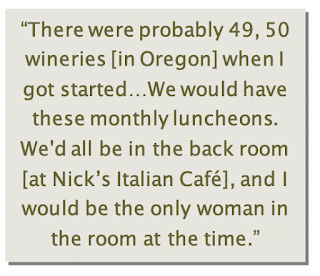
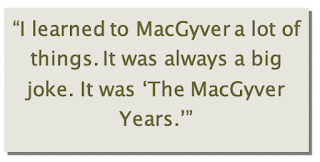
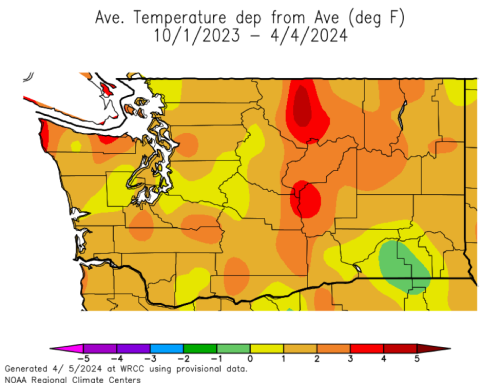
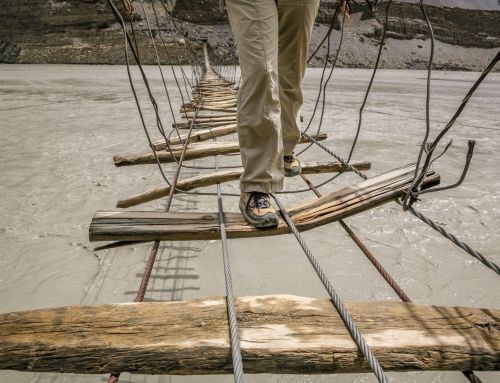
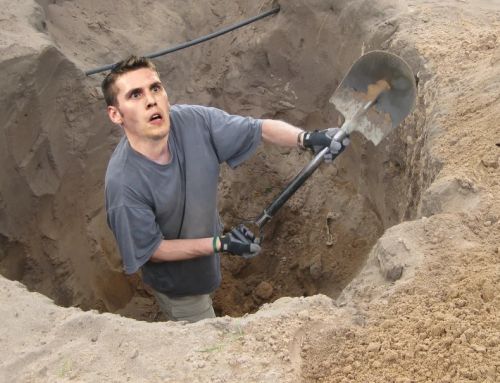
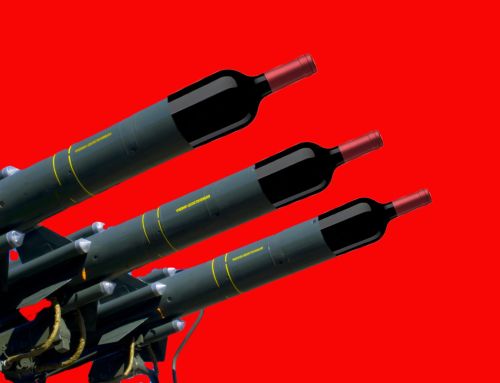
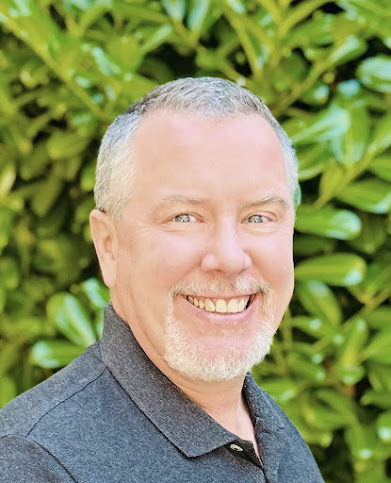
Fantastic interview! I, too, wanted to get into viticulture and enology at the same time Lynn was, and yes, it was not very open to young women. I am so enamored with her story. Thanks so much and looking forward to Part II.
Excellent interview! Thank you!
Thanks for this interview! I have worked as a woman in wine production for 28 years and although I never had the chance to get to know Lynn I looked up to her and admired her. She was 10 years ahead of me but even so it was still very difficult for me as a woman and I too experienced many of the same things she did. Looking forward to Part II!
I had the great pleasure of distributing all the LPA Rex Hill vintages as well as all the earlier vintages of Penner-Ash. I always respected and admired Lynn as one of Oregon's top winemakers. Cellar visits with her were always exciting and illuminating and presenting those wines in the market instilled pride.